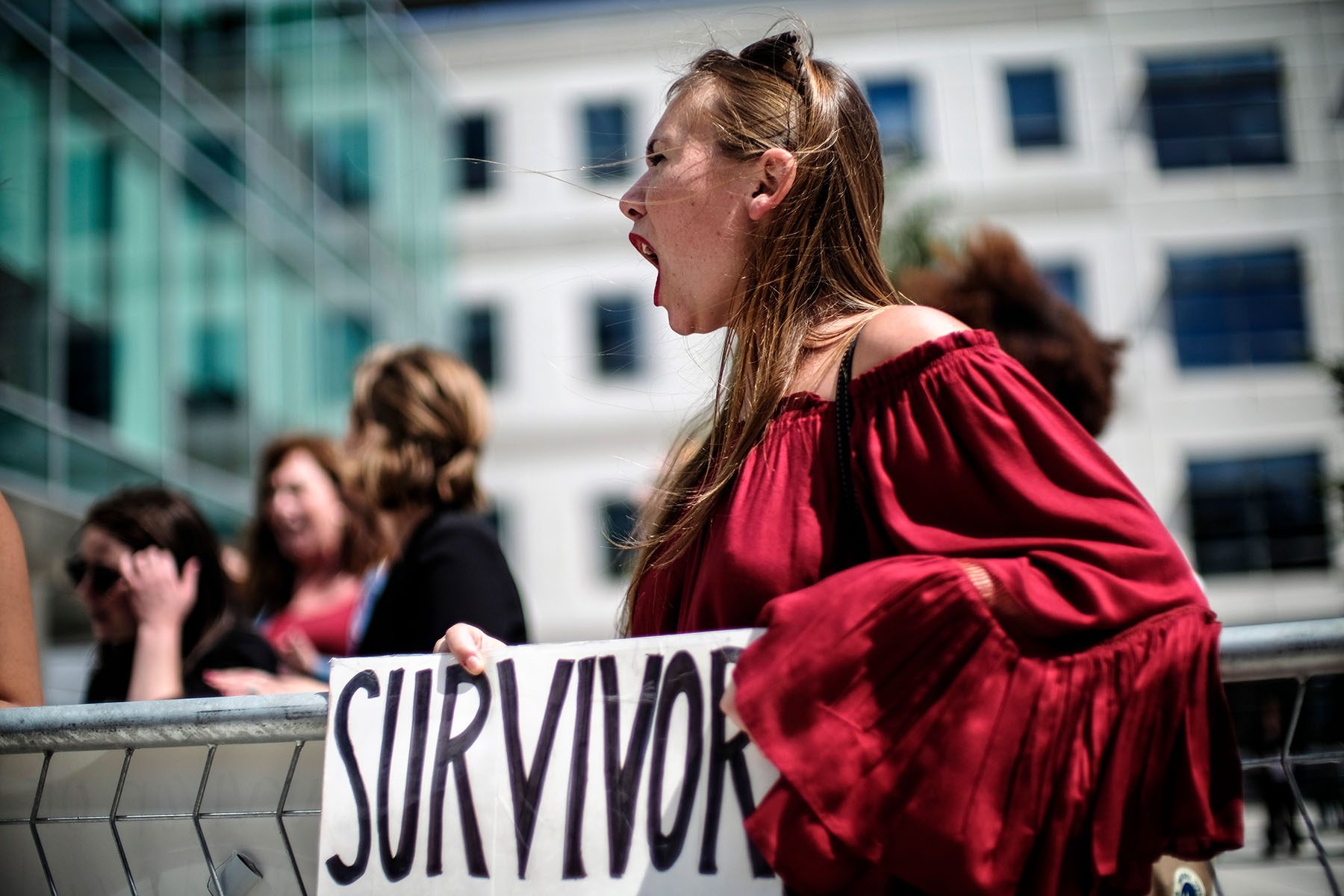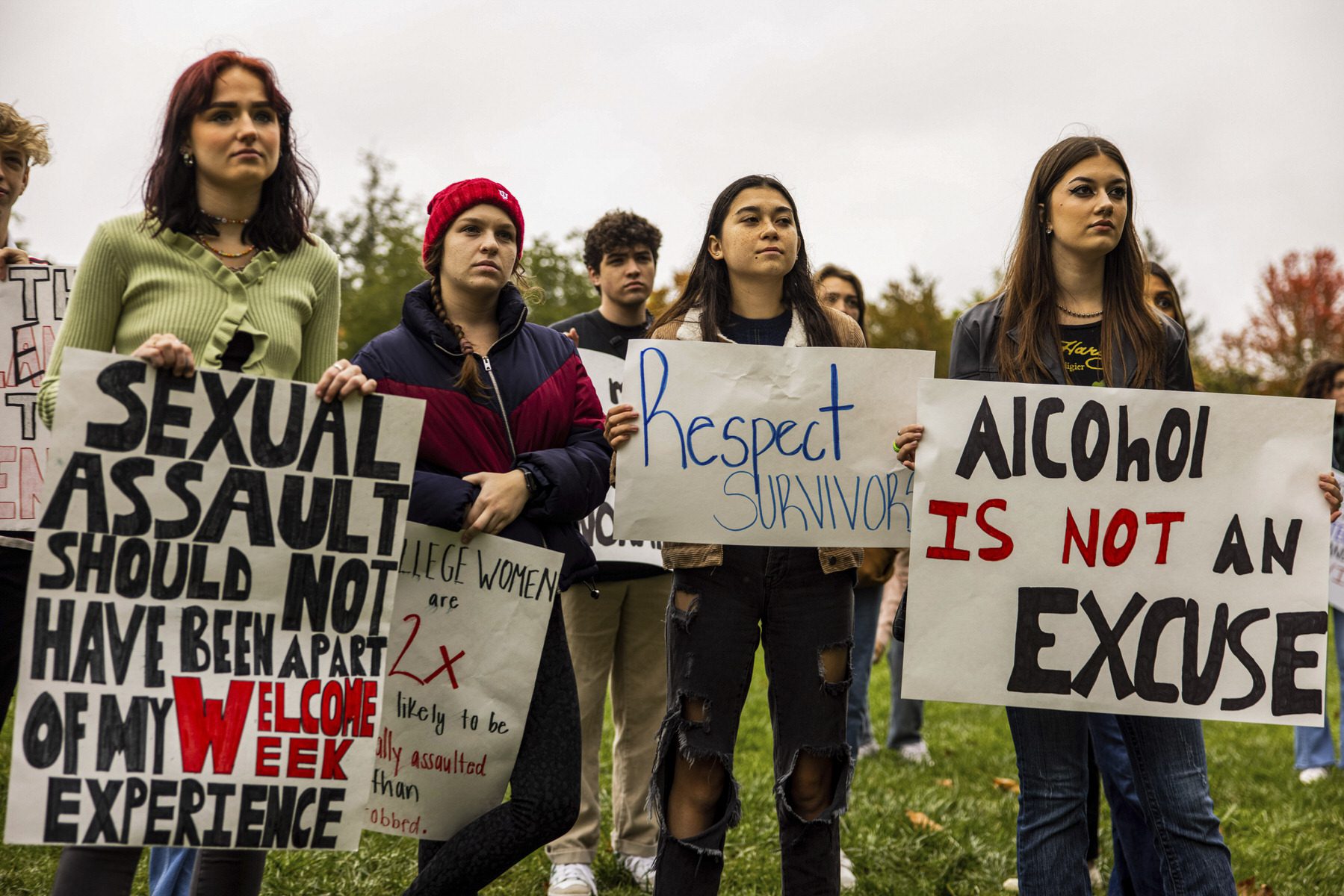At Virginia Tech, four sexual assaults were reported in one November week. At the University of North Carolina, one individual was linked to three sexual assaults in as many months this fall. And at Indiana University, school police have been investigating more than two dozen sexual assault cases on the flagship Bloomington campus this semester — more than the total number of sexual assaults reported each of the past three years.
Even before students returned to campus, advocacy groups were expressing heightened concern about the “red zone,” the period from August to late November when roughly 50 percent of sexual assaults occur at colleges during any given year. New students unfamiliar with campus life are especially at risk of assault, and because the pandemic disrupted last school year, two classes of students found themselves on campus for the first time this fall at many universities. The group End Rape on Campus (EROC) called this a “double red zone.”
“Now that we have both of those classes coming in together, there’s this exacerbation of the red zone,” said Kenyora Parham, EROC’s executive director. “Both the freshman and sophomore classes are coming in for the first time and really haven’t been exposed to this new way of learning and formulating new friendship groups and trying to just figure out their way, especially in terms of living on campus for the first time on their own, away from their parents or guardians.”
Although comprehensive statistics aren’t available for this year and sexual assaults in college communities are notoriously undercounted, administrators, students and activists at many major universities — including University of Colorado Boulder, the University of Southern California and Penn State — have been raising alarms about sexual assault since campus life returned closer to pre-pandemic levels this fall. They point to an increase in reported sexual assaults in some cases and, in others, concerns about a lack of adequate response by police and university officials. EROC estimates that more than 100 protests against rape culture have been held on campuses nationwide since the start of the school year.

On top of two groups of new students attending college this year on many campuses, it’s become more challenging to report many sexual assaults through official university channels. New Title IX regulations were finalized last year by then-Secretary of Education Betsy DeVos that set new rules for questioning during sexual assault hearings and limit what constitutes sexual harassment, guidelines designed to offer more protections to students accused of sexual violence. Advocates for sexual assault victims are calling on the Biden administration to repeal the rules, stressing that many assaults are not reported and recent rule changes will exacerbate that problem.
“If nothing is done with these Title IX regulations, schools will not only continue to sweep sexual assault under the rug, but student survivors will not be protected; students survivors will actually drop out,” Parham said. “Changing the Title IX rules is a critical step to ensuring that no student is kicked out of school for sharing their story or their truth, and especially because we know those students who are reporting — particularly students of color, low-income students, LGBTQ+ students — are disproportionately impacted by this.”
EROC has garnered more than 55,000 signatures from students, parents, lawmakers and other advocates throughout the country urging the Biden administration to overturn the DeVos-era regulations. The Department of Education in April initiated the process of reversing the 2020 guidelines with a comprehensive review, but official changes aren’t expected to be implemented until May, near the end of the current school year.
“We want something sooner than May, because students are still going to continue to experience sexual assault at even higher rates than ever before, and schools can continue to be held unaccountable for what is happening to students,” Parham said. “We’re trying everything we can do to really have the Department of Education understand how detrimental these Title IX rules are and how they deny our students the most basic protections.”
Carolina Bell, a junior at Virginia Tech and president of campus group the United Feminist Movement, which organized a protest against sexual violence this fall, would also like to see the Biden administation act quickly to reverse DeVos’s Title IX regulations.
“Students are being hurt now, and action is really needed as soon as possible,” she said.
Virginia Tech has formed a working group to address sexual assault in its community. University President Tim Sands said November 4 that it was spurred by mulitple reports of sexual violence at the beginning of the year and that the school’s leadership is “committed to a university-wide response aimed at meaningful outcomes and accountability.”
The university’s Title IX coordinator, the Virginia Tech police department chief, the director of housing and residence life are part of the 21-member Sexual Violence Culture and Climate Work Group, which met for the first time last month. But Bell is concerned that university officials have included just two undergraduate students in the group.
“It’s really important for universities trying to grapple with this issue to listen to student voices, survivor voices and activist voices because we are the ones on our campuses that have the understanding and the experience,” Bell said. “We’re the heart of the university.”
Title IX Coordinator Katie Polidoro, who serves as chair of the working group, said that she had not yet received clearance from the university to speak with The 19th about the group.
Students at Arizona State University have also been raising concerns about how their voices are heard on sexual assaults on campus. The university in June was found to have violated the Clery Act, which requires colleges and universities to document campus crime statistics. ASU failed to quickly notify students about a sexual assault that occurred in a residence hall and to protect a survivor against possible retaliation, among other violations, according to attorney Laura Dunn, who filed the complaint on a client’s behalf. A spokesperson said at the time that ASU immediately made changes to fall into compliance once more but did not respond to The 19th’s request for comment about current efforts to lower sexual assault numbers.
Between August and November 2021, ASU was investigating 10 sexual assaults, the total number of cases reported at the main Tempe campus in 2018. In 2019, reports at ASU Tempe more than doubled to 23, and, in 2020, amid pandemic lockdowns, the number dropped to 17.
Jasmine Lester, a 2011 alum of Arizona State University and founder of Sun Devils Against Sexual Assault (SDASA), said that the Title IX and #MeToo movements have empowered more survivors to report their assaults. SDASA is not affiliated with ASU but advocates for students and alumni from the university who have survived sexual assault. Lester wants to ensure that these individuals have the support needed during the reporting process and that fewer students are subjected to sexual violence.
Her organization recently requested a meeting with ASU President Michael Crow after he was quoted remarking during a recent student forum that ASU does not have “an issue” with its response to sexual assault but students may be “uncomfortable reporting.” So far, Crow has not met with her group, Lester said. Sun Devils Against Sexual Assault has drafted an ASU Campus Assault Advocacy, Resources & Education proposal demanding the university hire more prevention staff and victim advocates. The proposal was based, in part, on the stories and concerns ASU students who are survivors of sexual assault shared as part of a social media campaign about their experiences.
Lester told The 19th that universities need to provide professionally run sexual violence prevention education to all students on an ongoing basis. They should also ensure that they have a sufficient number of confidential victim advocates and a 24/7 advocacy line.

While some students and advocates at colleges and universities across the country are demanding to meet with the leadership of their institutions, others are protesting or boycotting fraternities linked to sexual assault, as students at Indiana University have. Calls to dismantle the Greek system altogether are growing, with critics pointing to research that fraternity members are more likely to commit rape than their non-Greek counterparts. Sorority members are also more likely to be raped than their unaffiliated peers. At USC, fraternity-related rapes have led to student protests and to President Carol L. Folt to acknowledge in an October 29 letter that the university has been slow to act on several sexual assaults and druggings linked to one fraternity in September alone.
Combatting the red zone — and sexual violence that takes place at any time of the school year — has different solutions, depending on the school, according to Parham. There is no one way to respond to sexual assault or work to reduce these crimes, but colleges and universities should take their cues from the students, she suggested.
“Universities and colleges need to really be listening to the students themselves because they are the ones who are most affected by what’s happening,” she said. “They know what they need, they know what needs to go, what needs to change or what needs to be added to their campuses. Every college university looks different, so we really have to be mindful about what the particular needs of the students are and really listening to what it is and how it is that their schools can make those changes.”






